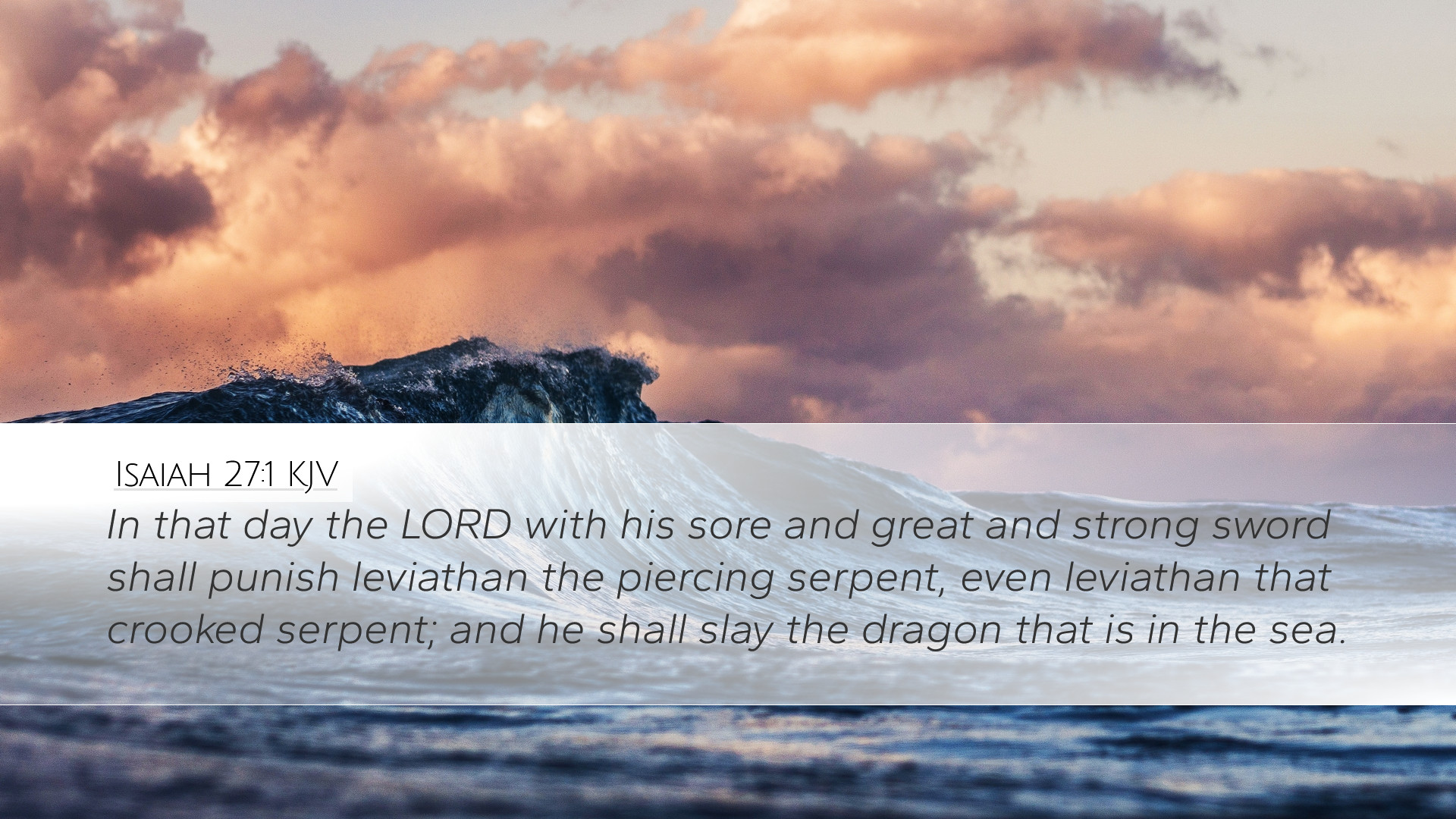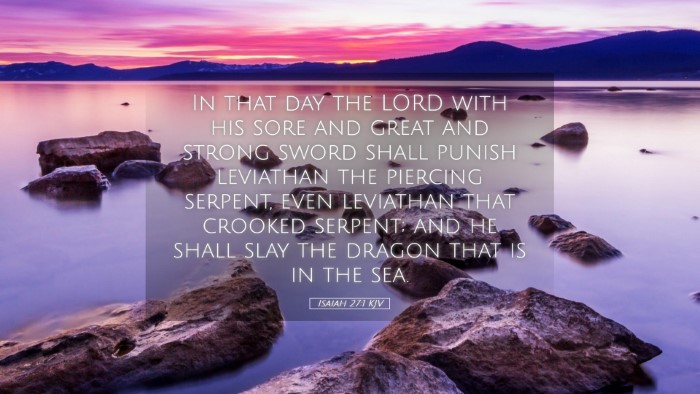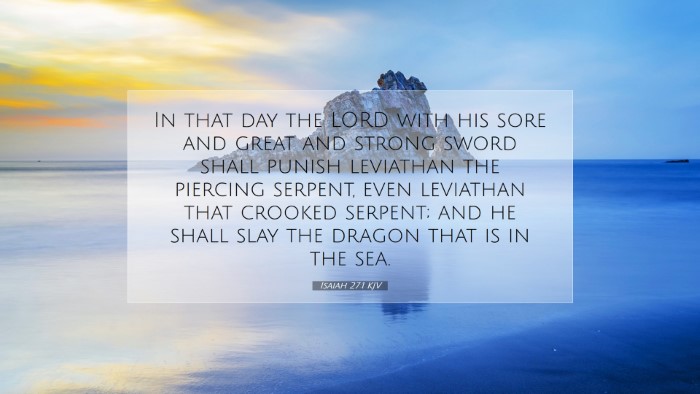Commentary on Isaiah 27:1
Verse Reference: Isaiah 27:1 - "In that day the LORD with his severe sword, great and strong, will punish Leviathan the fleeing serpent, Leviathan that twisted serpent; and he will slay the dragon that is in the sea."
Introduction
The prophet Isaiah, in this verse, presents a vivid and compelling image of God's decisive action against chaos and evil, personified in the figure of Leviathan. This commentary draws insights from notable public domain scholars including Matthew Henry, Albert Barnes, and Adam Clarke, offering a comprehensive understanding suitable for pastors, students, theologians, and Bible scholars.
Interpretation of Leviathan
Leviathan serves as a multifaceted symbol in the biblical narrative. Scholars agree that it represents chaotic forces of evil and opposition against God's people. Matthew Henry interprets Leviathan as embodying the strength and determination of rebellious nations and spiritual enemies:
- Matthew Henry notes: "Leviathan signifies those formidable powers that oppose God's kingdom and his people." This aligns with the imagery of a serpent, representing not just physical enemies, but also spiritual adversities.
- Albert Barnes elaborates: "The term Leviathan in the ancient world was often associated with a large sea creature, portraying the might of nations in rebellion." He highlights the significance of the sea metaphor as a source of chaos.
- Adam Clarke adds: "The twisting of Leviathan indicates the cunning and deceptive nature of sin and opposition to God’s purposes." This reveals how the serpent operates in subtlety and guile, mirroring the actions of the serpent in the garden of Eden.
Theological Significance
This verse underscores God's sovereignty and power over all creation, including the forces of evil. The phrase "with his severe sword" denotes a divine judgment that is both intentional and severe. Each commentator brings forward the seriousness of God's reprisal against evil:
- Henry comments on the depiction of God's sword: "The Lord wields his sword as a sovereign authority, emphasizing that no power can stand against him." This statement reflects God's supreme control over the universe.
- Barnes suggests: "The ‘great and strong’ sword symbolizes the Lord’s ability to deliver justice as He sees fit, ensuring that eventual triumph is certain." His interpretation conveys a message of hope amidst struggles.
- Clarke points out: "The emphasis on 'that day' indicates a future time when God's judgment will decisively eradicate evil, instilling hope for restoration." This eschatological viewpoint encourages believers to persevere through trials, trusting in God’s ultimate victory.
Imagery of the Dragon and the Sea
The imagery of the dragon that dwells in the sea further emphasizes the cosmic battle against evil. This evokes thoughts of chaos, danger, and fear, illustrating the stakes involved in spiritual warfare:
- Henry observes: "The reference to the dragon highlights the absolute power of adversarial forces, yet underscoring God's ability to conquer even what seems unbeatable." This duality reflects a spiritual reality where, despite appearances, God’s power prevails.
- Barnes interprets the 'dragon' as: "A representation of monstrous opposition to God's will, showcasing the intensity of the conflict faced by His followers." This recognition can help leaders and scholars contextualize their battles in today’s world.
- Clarke connects the dragon with historical oppressors: "Just as the ancient dragon was feared, so too are the nations that have historically vexed Israel. Yet this text reassures of divine intervention." This offers practical application, encouraging believers to remain steadfast against oppressive systems.
Application for Believers
In light of the theological insights presented, Isaiah 27:1 serves as a source of encouragement and a call to action for believers:
- Encouragement in Difficult Times: The ultimate defeat of Leviathan assures believers that God is in control, even in chaotic circumstances. The faithful can rest in the promise of divine justice and hope for the future.
- Call to Vigilance: The twisting nature of evil suggests the necessity for spiritual vigilance. Believers are urged to discern and stand against the subtle manifestations of sin in their lives and communities.
- Hope for Redemption: This passage promises that God’s intervention leads to restoration of order and peace, encouraging Christians to hold onto hope that God will ultimately rectify every injustice.
Conclusion
Isaiah 27:1 invites deep reflection on God’s sovereignty, justice, and the cosmic struggle against evil. By synthesizing insights from historic commentaries, we recognize the enduring relevance of this text for guiding faith, practice, and understanding in the modern world. Scholars, pastors, and students are encouraged to explore this verse as a profound declaration of God’s might and a promise of ultimate victory over the adversaries of faith.


